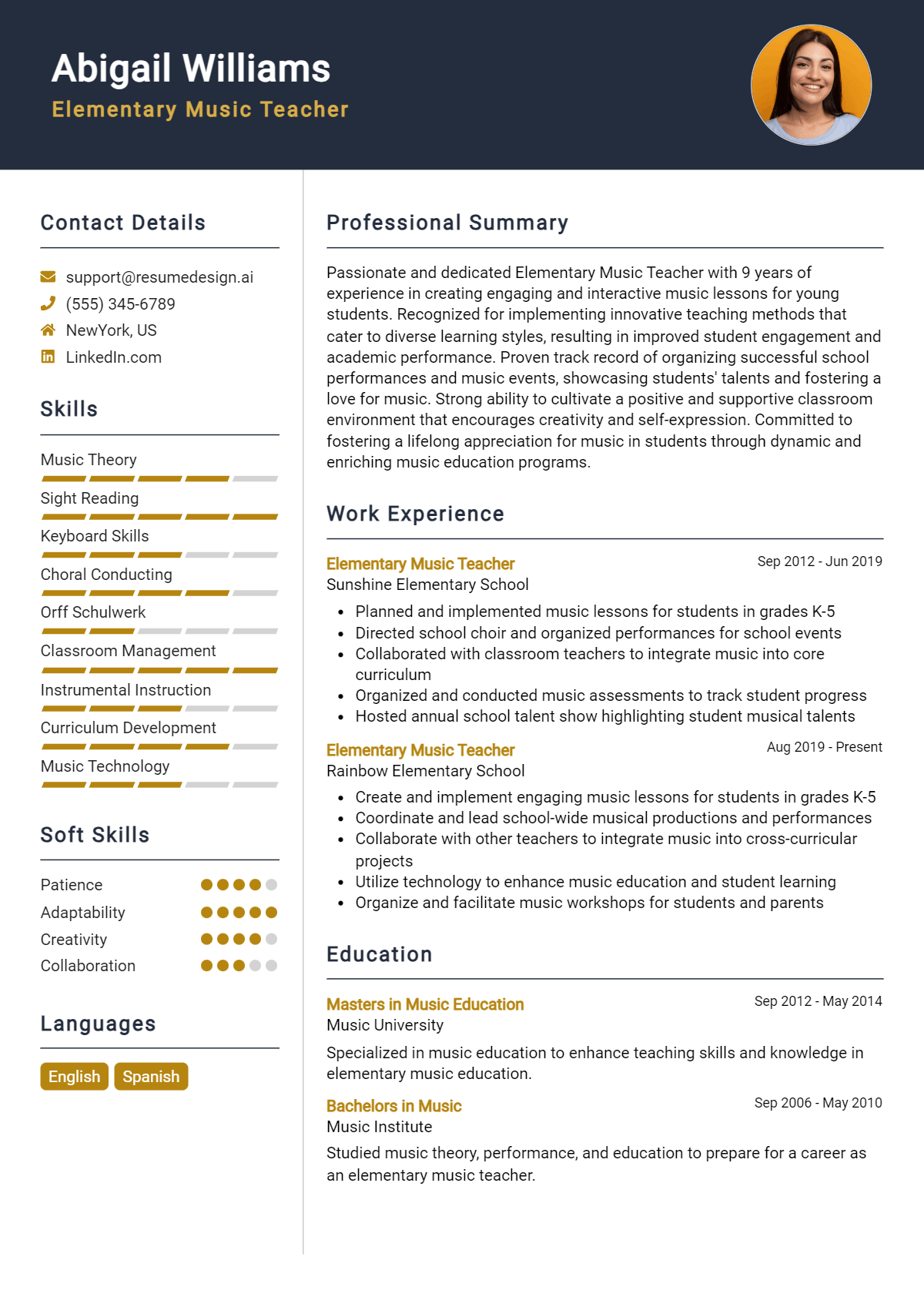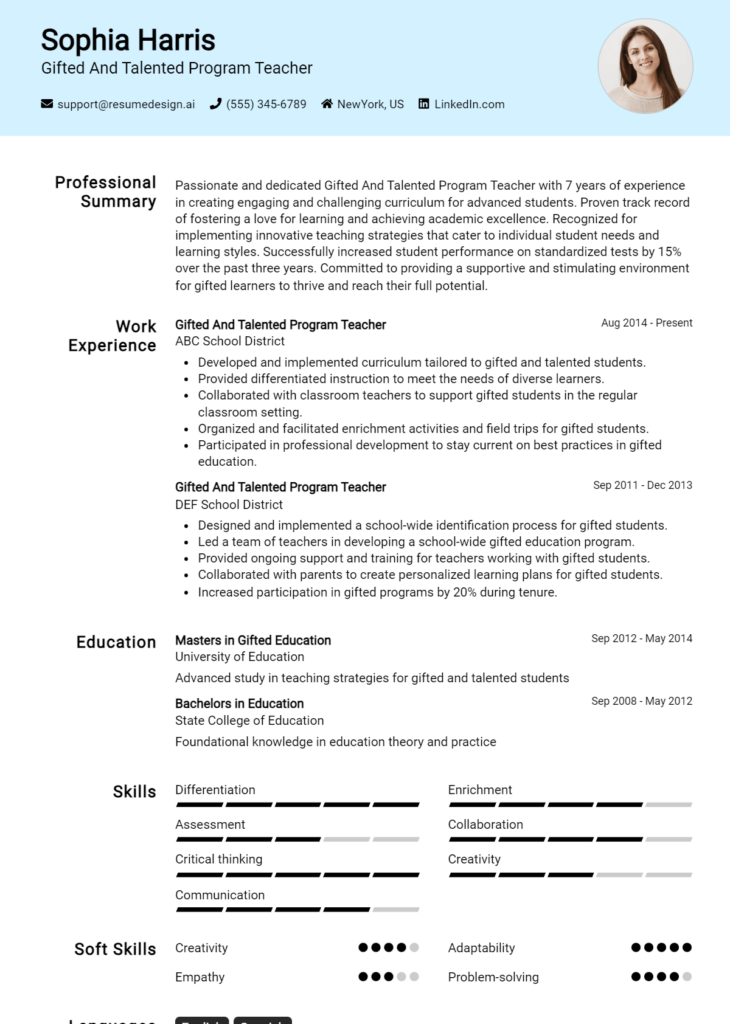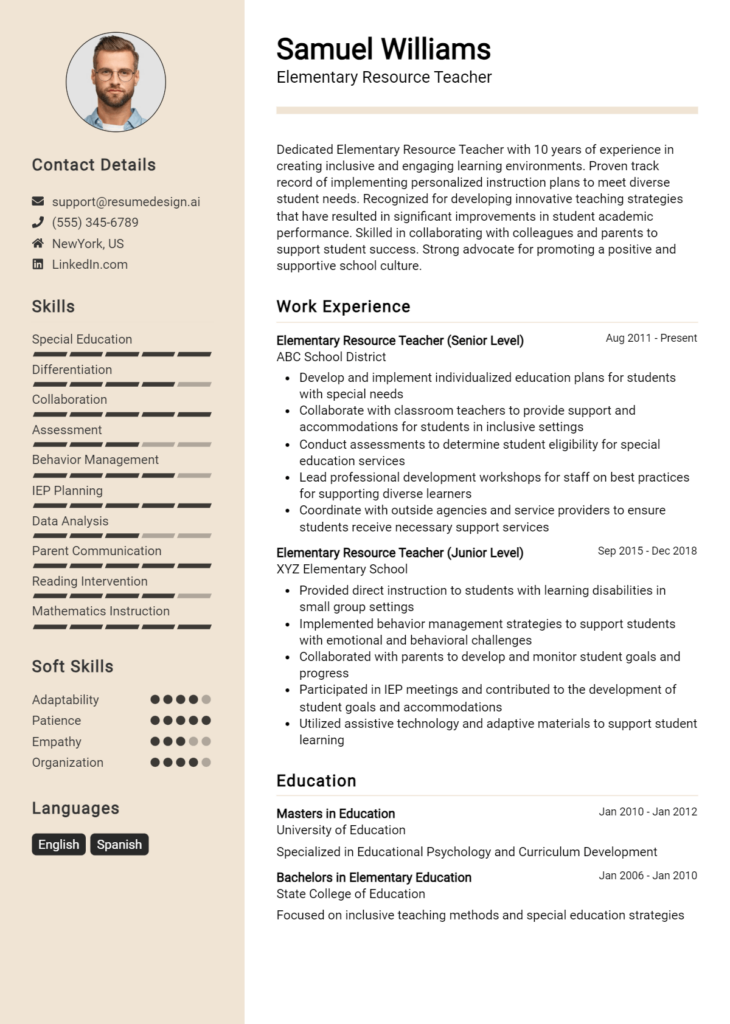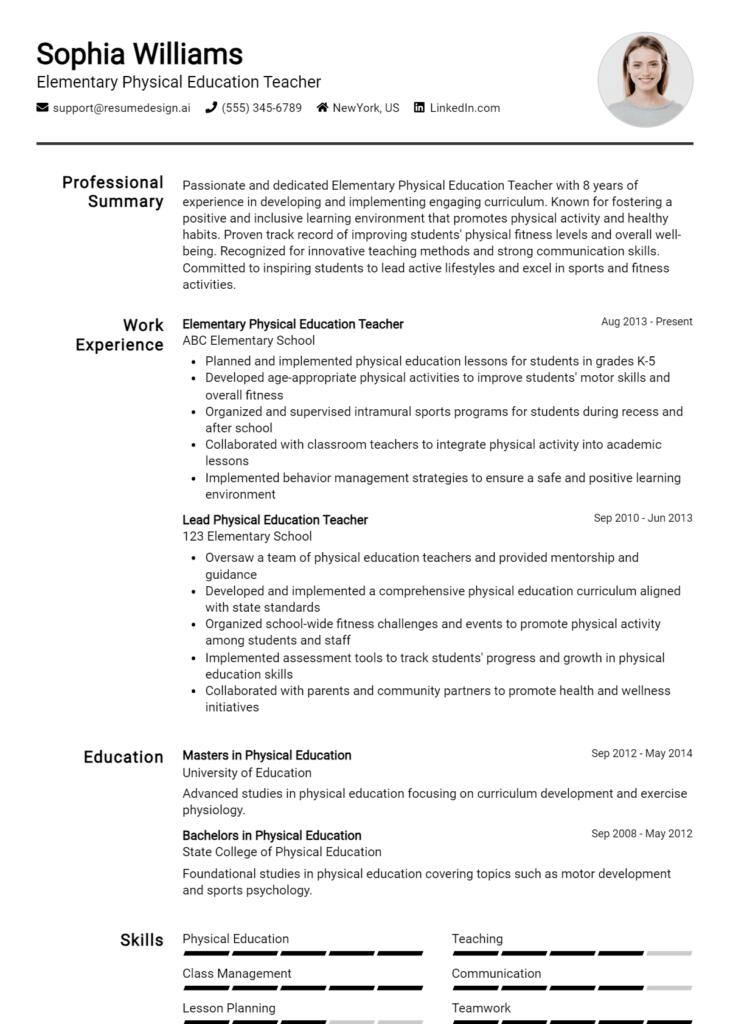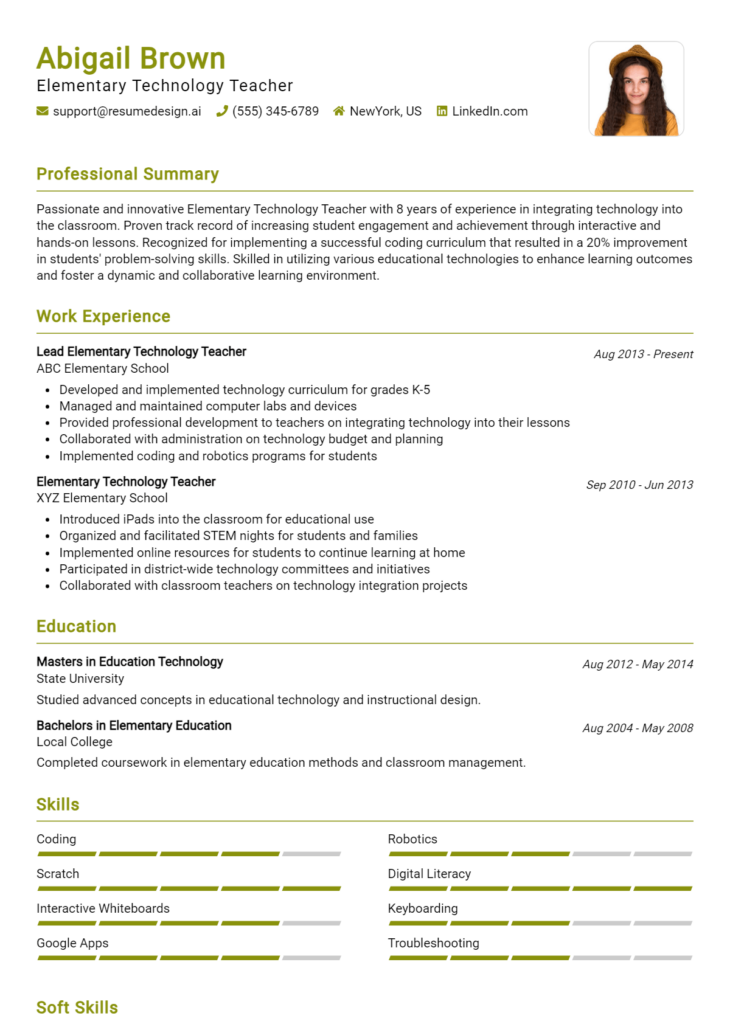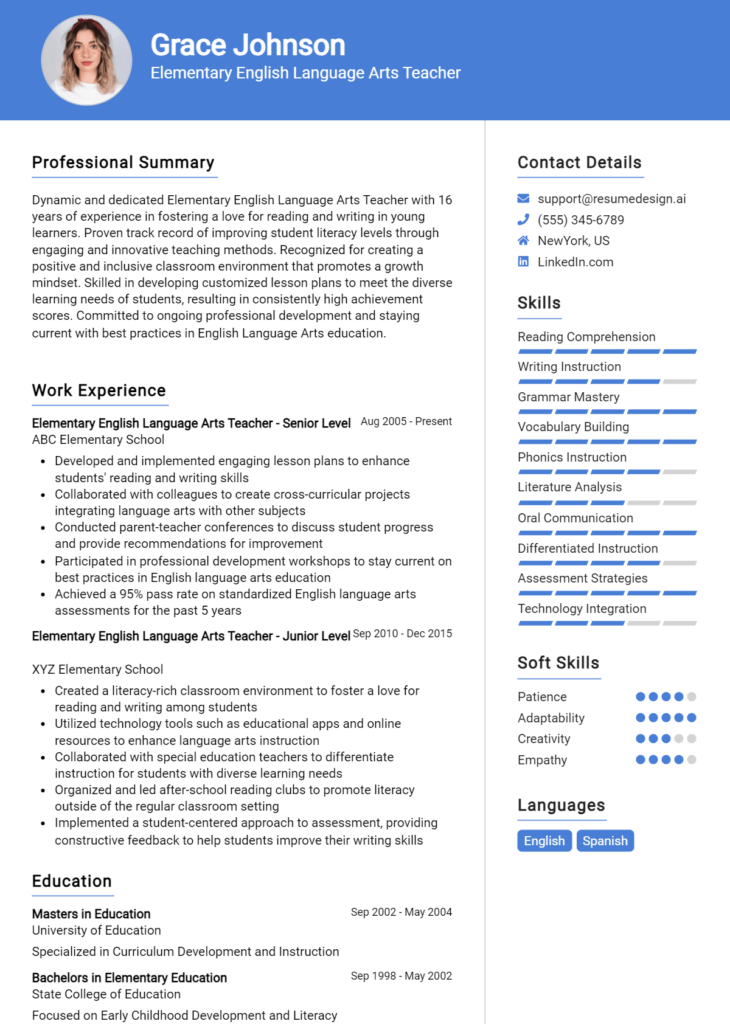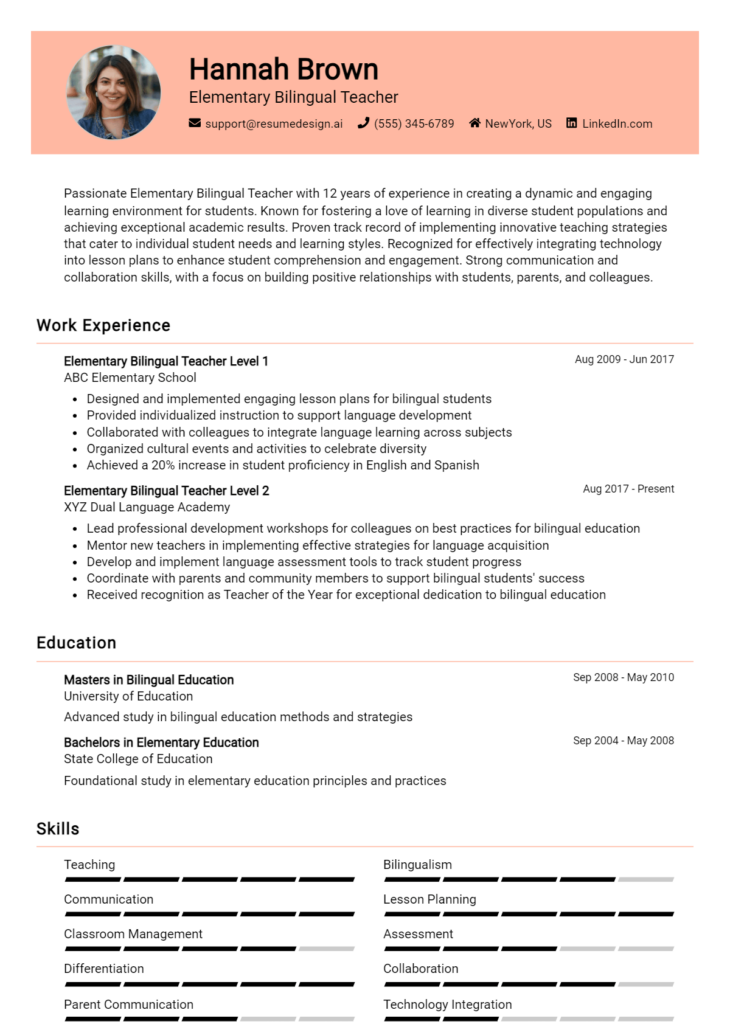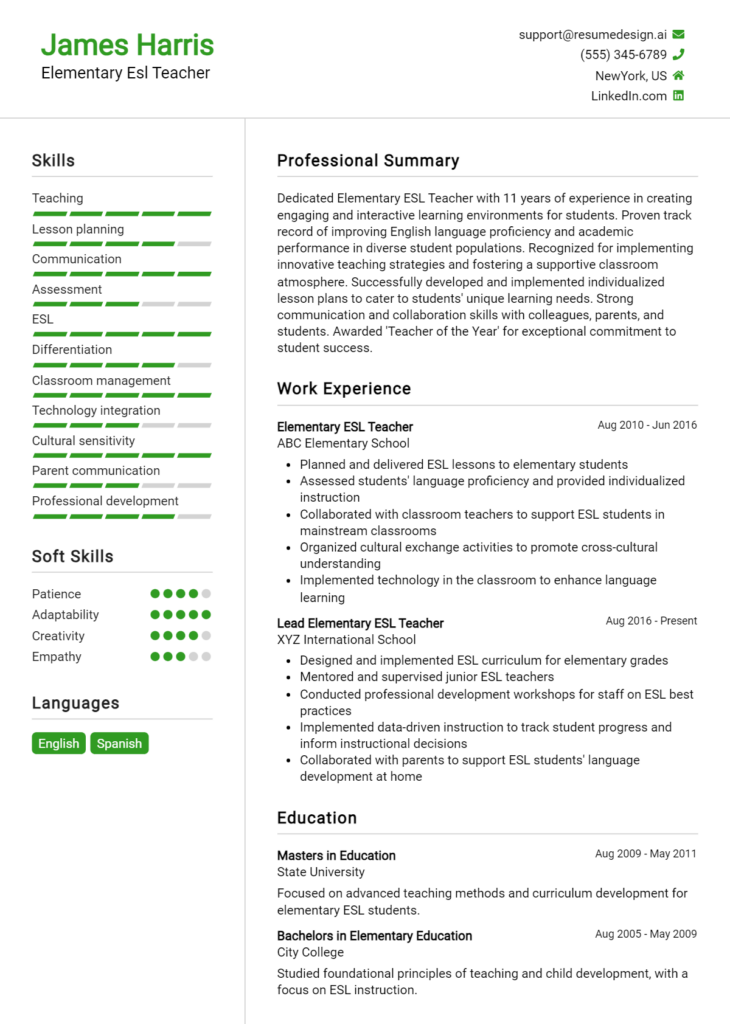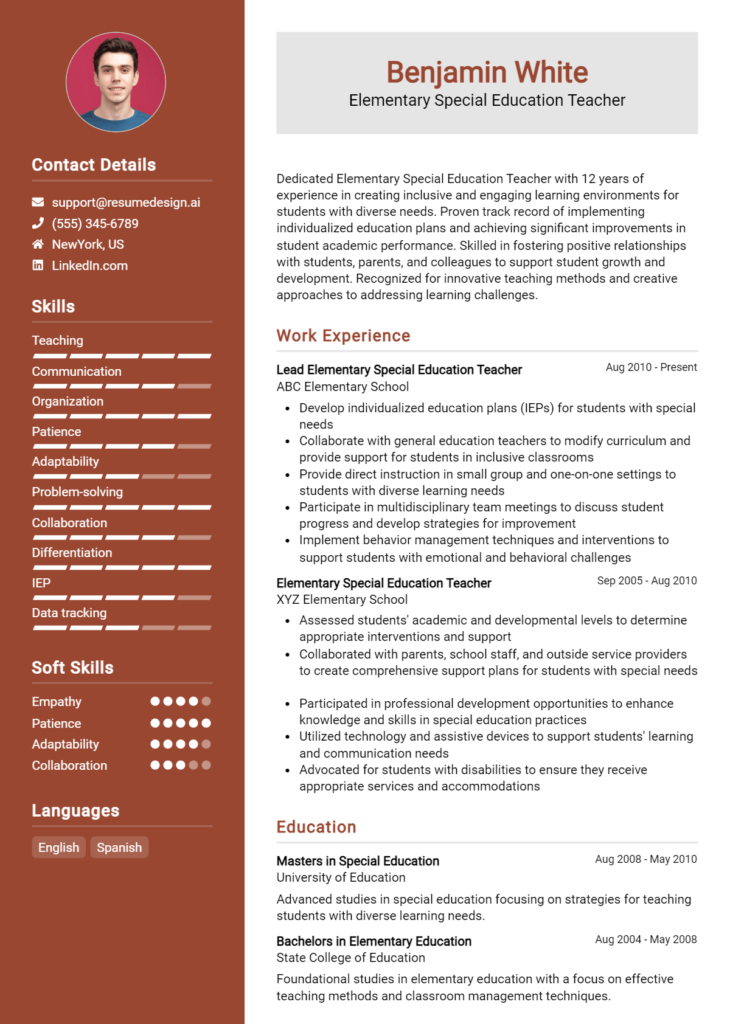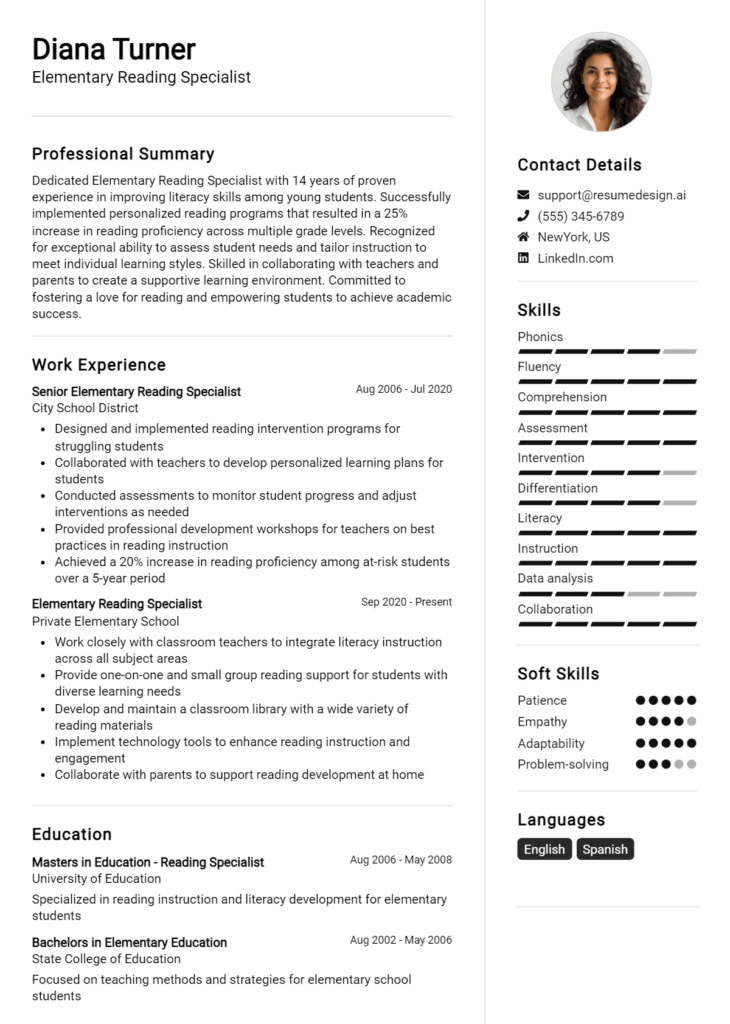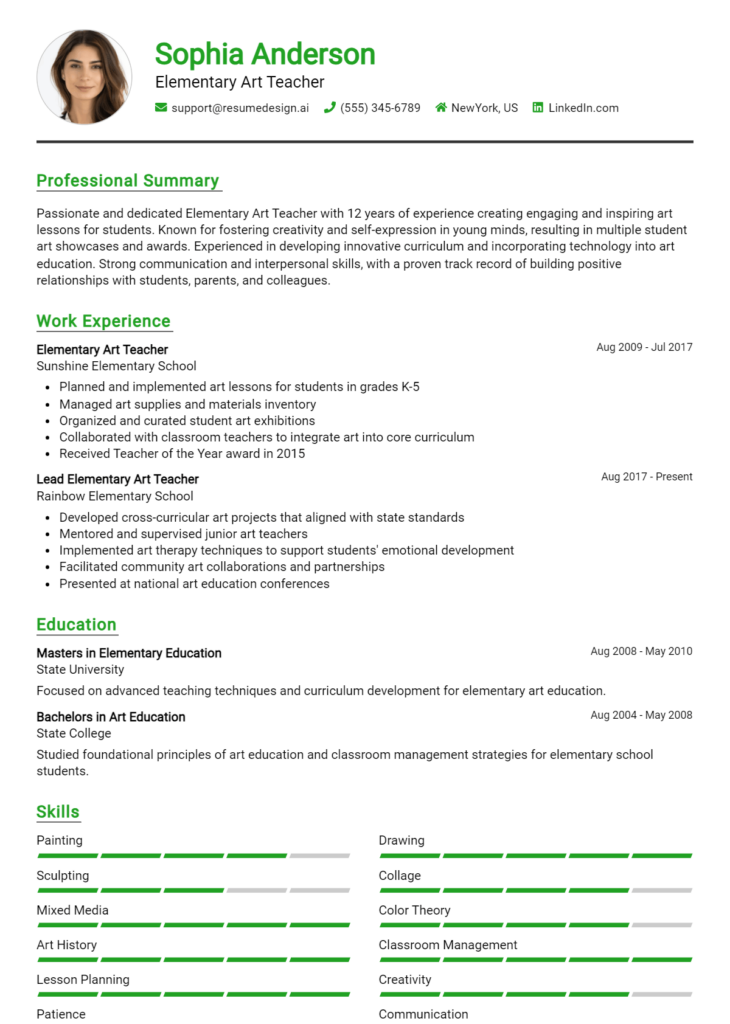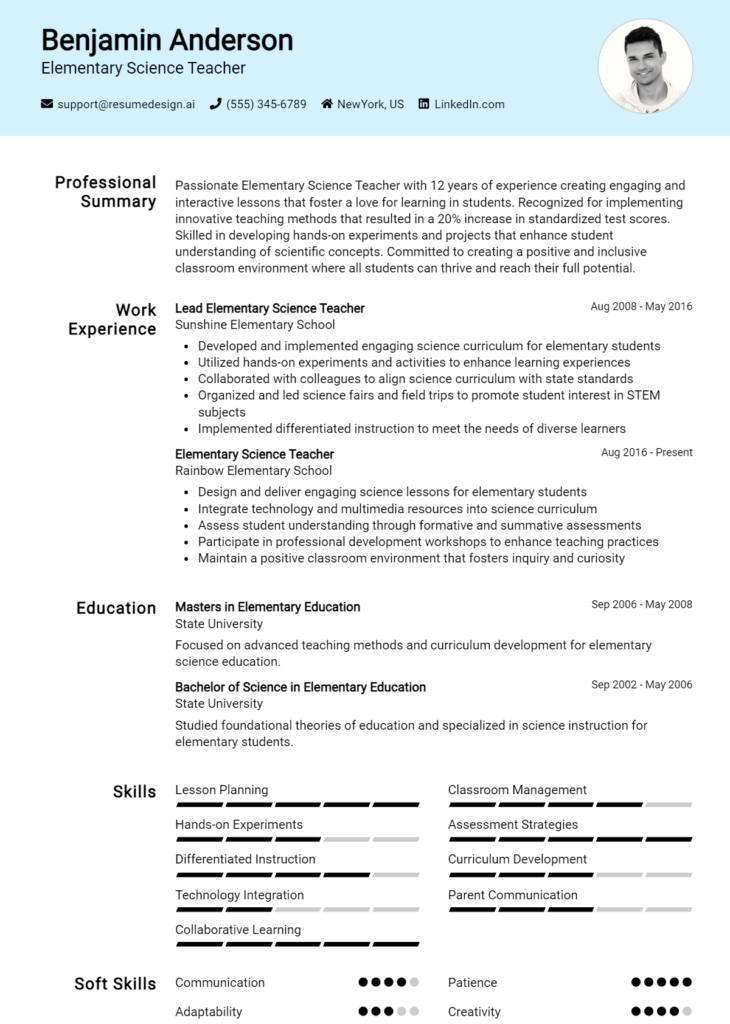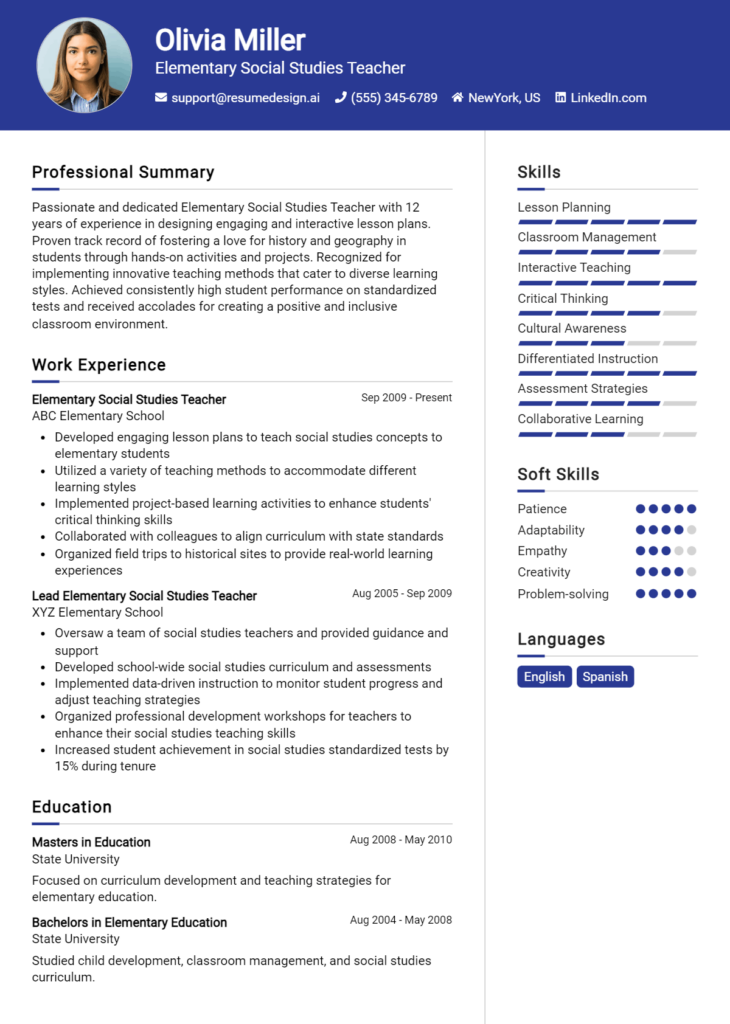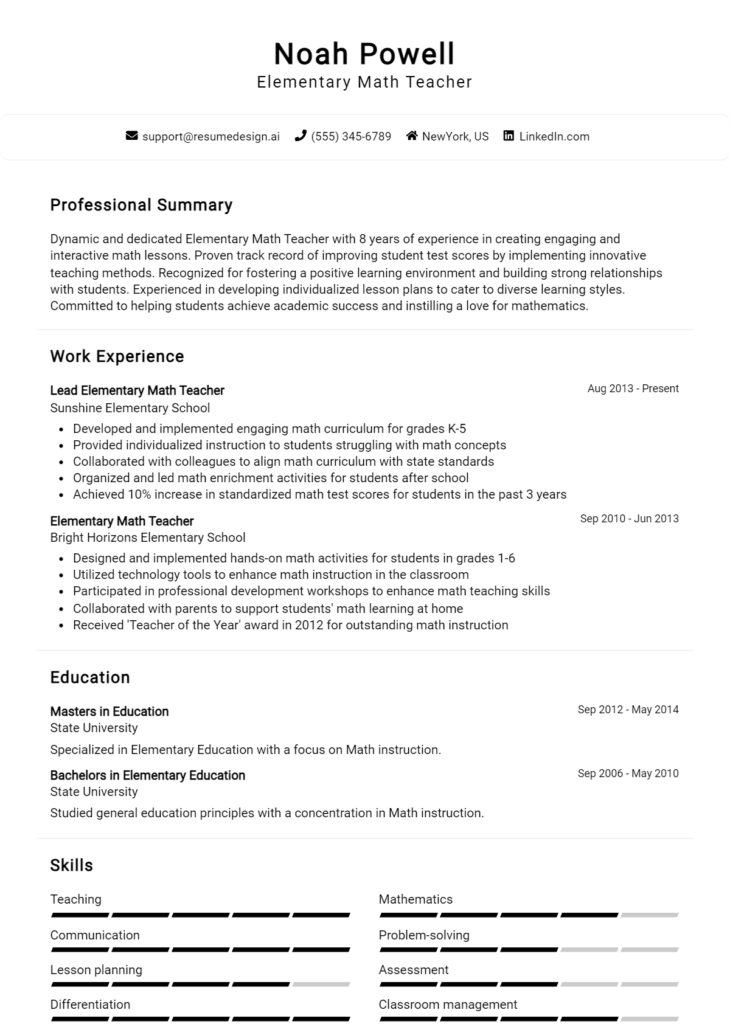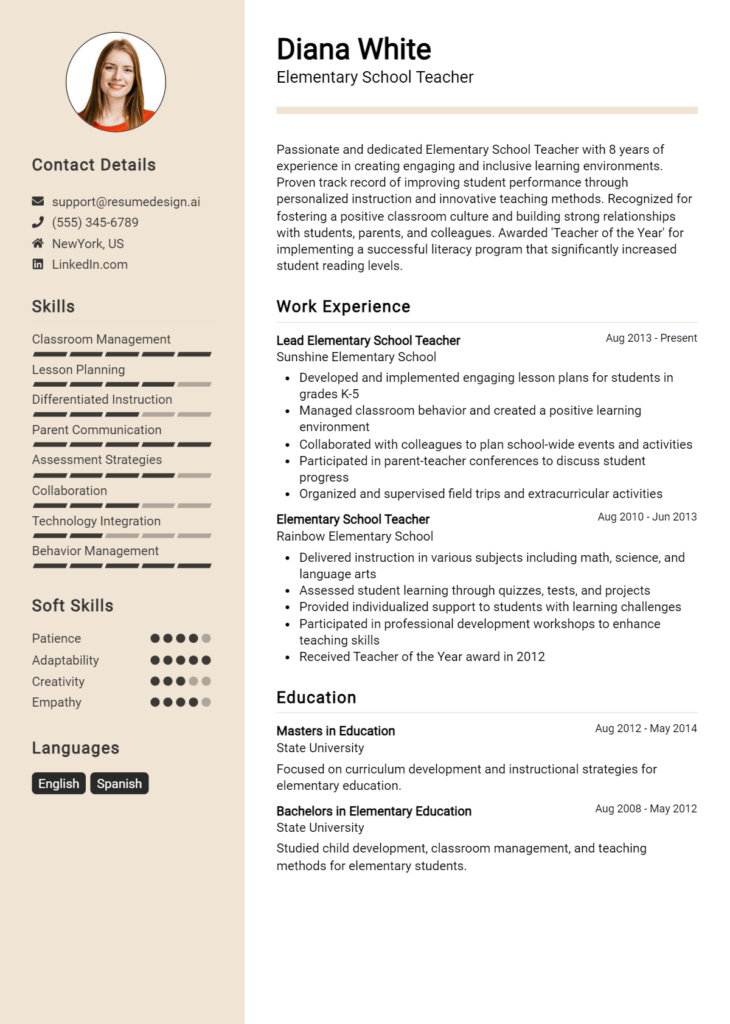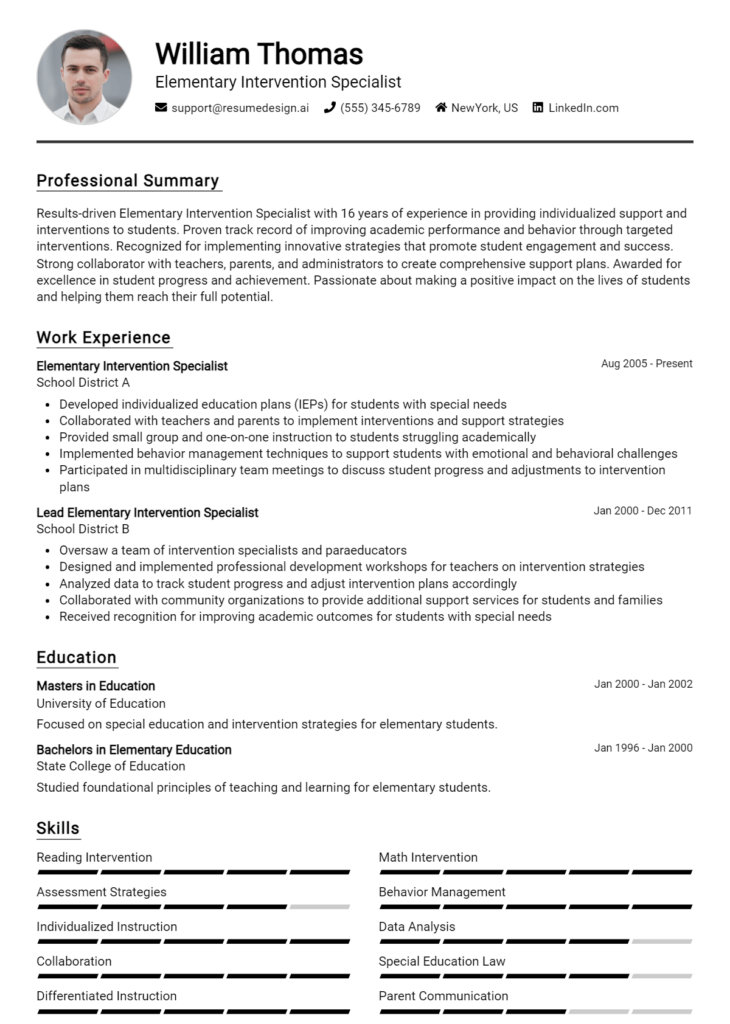Elementary Music Teacher Core Responsibilities
An Elementary Music Teacher plays a pivotal role in fostering creativity and collaboration among students. Key responsibilities include developing age-appropriate music curricula, conducting engaging lessons, and integrating music with other subjects to enhance learning. Essential skills encompass technical knowledge of music theory, operational planning for performances, and problem-solving techniques to address diverse student needs. A well-structured resume highlighting these qualifications not only showcases the teacher’s expertise but also aligns with the organization’s mission to cultivate well-rounded individuals.
Common Responsibilities Listed on Elementary Music Teacher Resume
- Develop and implement engaging music curriculum for elementary students.
- Conduct individual and group music lessons, including vocal and instrumental instruction.
- Organize school concerts, recitals, and performances to showcase student talent.
- Integrate music education with other subjects to enhance interdisciplinary learning.
- Assess student progress and provide constructive feedback on musical skills.
- Maintain classroom instruments and ensure a safe and organized learning environment.
- Collaborate with other educators to support school-wide programs and initiatives.
- Encourage creative expression and foster a love for music among students.
- Adapt teaching methods to accommodate various learning styles and abilities.
- Stay current with music education trends and continuously improve teaching practices.
- Communicate effectively with parents regarding student progress and events.
High-Level Resume Tips for Elementary Music Teacher Professionals
In the competitive field of education, a well-crafted resume can be the key to unlocking opportunities for Elementary Music Teacher professionals. Your resume often serves as the first impression you make on a potential employer, making it crucial to reflect not only your skills but also your achievements and passion for music education. A strong resume will not only showcase your teaching abilities but also highlight your unique contributions to student development and musical engagement. This guide will provide practical and actionable resume tips specifically tailored for Elementary Music Teacher professionals, ensuring that you stand out in a crowded job market.
Top Resume Tips for Elementary Music Teacher Professionals
- Tailor your resume for each job application by closely aligning your skills and experiences with the specific job description.
- Highlight relevant teaching experiences, such as classroom management, lesson planning, and curriculum development focused on music.
- Quantify your achievements where possible, such as the number of students you taught, performances organized, or musical events facilitated.
- Showcase your knowledge of various musical instruments and teaching methods that enhance student engagement and learning.
- Include any certifications, licenses, or specialized training that pertain to music education and teaching.
- Emphasize collaboration with other teachers, parents, and community members to foster a supportive music education environment.
- List any technology skills, such as proficiency in music software or online teaching tools, that can enhance your teaching methods.
- Utilize action verbs to describe your responsibilities and accomplishments, making your resume dynamic and engaging.
- Incorporate a section for professional development, such as workshops or courses attended that are relevant to music education.
- Maintain a clean and organized layout to ensure readability, using bullet points and headers effectively to guide the reader.
By implementing these tips, you can significantly increase your chances of landing a job in the Elementary Music Teacher field. A focused and polished resume not only demonstrates your qualifications but also your dedication to fostering a love of music in young learners, making you a standout candidate for potential employers.
Why Resume Headlines & Titles are Important for Elementary Music Teacher
In the competitive field of education, particularly within the realm of music, a well-crafted resume headline or title is crucial for an Elementary Music Teacher. This concise phrase serves as the first impression for hiring managers, summarizing a candidate's essential qualifications at a glance. A strong headline can instantly grab attention, conveying not only the applicant's role but also their standout skills, experience, and passion for music education. By being relevant and directly related to the position, it can set the tone for the rest of the resume, making it clear why the candidate is a strong fit for the role.
Best Practices for Crafting Resume Headlines for Elementary Music Teacher
- Keep it concise: Aim for one impactful phrase that summarizes qualifications.
- Be role-specific: Use terminology that reflects the specifics of the Elementary Music Teacher position.
- Highlight key strengths: Focus on a skill or achievement that distinguishes you from other candidates.
- Use action words: Start with dynamic verbs to convey enthusiasm and capability.
- Tailor to the job: Customize the headline based on the job description and requirements.
- Avoid jargon: Ensure the language is accessible and easily understood, avoiding overly complex terms.
- Incorporate relevant keywords: Use industry-specific keywords that align with the role to enhance searchability.
- Reflect your personality: Infuse a sense of your teaching style or philosophy to make the headline memorable.
Example Resume Headlines for Elementary Music Teacher
Strong Resume Headlines
Passionate Elementary Music Teacher with 10+ Years of Experience in Creating Engaging Curriculum
Innovative Music Educator Specializing in Integrating Technology in the Classroom
Dedicated Music Teacher Committed to Fostering a Love for Music in Young Learners
Weak Resume Headlines
Music Teacher
Experienced Educator
The strong headlines are effective because they clearly articulate the candidate's qualifications and unique attributes, making them stand out in a crowded applicant pool. They focus on specific achievements and teaching philosophies that resonate with hiring managers looking for passion and expertise. In contrast, the weak headlines fail to impress due to their vagueness and lack of detail; they do not provide any insight into the candidate’s strengths or contributions, leaving hiring managers with no compelling reason to read further.
Writing an Exceptional Elementary Music Teacher Resume Summary
A well-crafted resume summary is crucial for an Elementary Music Teacher as it serves as the first impression to hiring managers. This brief yet powerful statement is your opportunity to highlight key skills, relevant experience, and notable accomplishments in the field of music education. A strong summary quickly captures attention, making it essential for candidates to convey their passion for music, teaching abilities, and any unique contributions they can bring to the school. It should be concise, impactful, and specifically tailored to the job description to effectively resonate with the hiring team.
Best Practices for Writing a Elementary Music Teacher Resume Summary
- Quantify Achievements: Use numbers to demonstrate the impact of your contributions, such as the number of students taught or successful performances organized.
- Focus on Relevant Skills: Highlight specific skills relevant to music education, including proficiency in instruments, vocal training, and lesson planning.
- Tailor the Summary: Customize your summary for each job application by integrating keywords from the job description to align with the school's needs.
- Showcase Passion for Music Education: Convey your enthusiasm for teaching music and how it benefits student development.
- Highlight Collaborative Experience: Mention any teamwork with other educators or participation in school events that demonstrate your ability to work within a community.
- Keep it Concise: Aim for 3-5 sentences that capture your essence without overwhelming the reader with too much information.
- Use Action Words: Start sentences with dynamic verbs to convey a sense of energy and proactivity.
Example Elementary Music Teacher Resume Summaries
Strong Resume Summaries
Dedicated Elementary Music Teacher with over 8 years of experience fostering a love for music in students, resulting in a 30% increase in participation in school choir and band programs. Proficient in piano and vocal instruction, with a focus on developing students' creativity and confidence.
Results-driven music educator with a proven track record of enhancing student engagement through innovative lesson plans and performance opportunities. Successfully organized two annual music festivals that showcased over 100 students, receiving accolades from parents and school administrators.
Enthusiastic music teacher specializing in integrating technology into the curriculum, leading to a 40% improvement in student music theory comprehension. Passionate about creating an inclusive environment that encourages every child's musical expression.
Weak Resume Summaries
Experienced teacher looking for a position in music education. I love teaching kids and have a background in music.
Music Teacher with some experience in the classroom. I enjoy working with students and want to help them learn music.
The examples of strong resume summaries stand out due to their specificity, quantifiable results, and targeted skills that directly relate to the role of an Elementary Music Teacher. They exhibit a clear understanding of the impact the candidate has made in their previous positions. In contrast, the weak resume summaries are vague and lack details, making it difficult for hiring managers to assess the candidate’s qualifications or potential contributions, ultimately diminishing their appeal.
Work Experience Section for Elementary Music Teacher Resume
The work experience section of an Elementary Music Teacher resume is a critical component that highlights the candidate's technical skills, ability to manage classroom dynamics, and commitment to delivering high-quality educational experiences. This section showcases previous roles and responsibilities, allowing hiring committees to gauge a teacher's proficiency in music education, curriculum development, and student engagement. By quantifying achievements and aligning experiences with industry standards, applicants can effectively demonstrate their impact on student learning and their readiness to contribute to a school's music program.
Best Practices for Elementary Music Teacher Work Experience
- Clearly outline specific roles and responsibilities held in previous positions.
- Quantify achievements, such as the number of students taught or improvements in student performance.
- Highlight any technical skills related to music technology, instruments, or curriculum design.
- Demonstrate collaboration by mentioning teamwork with other teachers, administration, or community musicians.
- Use action verbs to convey initiative and leadership in managing music programs.
- Align experiences with current educational standards and best practices in music education.
- Include professional development opportunities that showcase ongoing learning in music education.
- Tailor the work experience to reflect the specific requirements of the job you are applying for.
Example Work Experiences for Elementary Music Teacher
Strong Experiences
- Developed and implemented a school-wide music curriculum that increased student participation in music classes by 40% over two years.
- Collaborated with local musicians to create an after-school program, resulting in a 30% increase in students learning musical instruments.
- Led a team of teachers to organize a successful annual spring concert attended by over 300 parents and community members, enhancing community engagement.
- Utilized technology to integrate music composition software into the curriculum, improving student creativity and engagement as indicated by positive feedback from 90% of participants.
Weak Experiences
- Taught music classes to students.
- Helped organize school events.
- Participated in meetings about music education.
- Assisted with student performances occasionally.
The examples listed above illustrate the difference between strong and weak experiences. Strong experiences are specific, quantifiable, and demonstrate leadership and collaboration, highlighting the candidate's impact on their students and community. In contrast, weak experiences lack detail and measurable outcomes, making them less compelling to potential employers. Therefore, it is essential for candidates to present their work history in a way that clearly reflects their skills and contributions to music education.
Education and Certifications Section for Elementary Music Teacher Resume
The education and certifications section of an Elementary Music Teacher resume is a critical component that showcases the candidate's academic background, relevant industry certifications, and dedication to continuous learning. This section not only highlights the necessary qualifications to teach music effectively but also demonstrates a commitment to professional growth. By including relevant coursework, certifications, and any specialized training, candidates can significantly enhance their credibility and align themselves with the specific requirements of the job role, making a compelling case for their suitability as an educator in the field of music.
Best Practices for Elementary Music Teacher Education and Certifications
- Include degrees in music education, music performance, or related fields that are directly relevant to the position.
- List any state teaching certifications, including music endorsements or specialized licenses.
- Provide details on relevant coursework, such as music theory, pedagogy, and child development.
- Highlight any professional development workshops or seminars attended that pertain to music education.
- Include advanced or specialized certifications, such as Orff Schulwerk, Kodály, or Dalcroze Eurhythmics.
- Showcase participation in music education organizations or associations as a member or volunteer.
- Be specific about the level of education achieved, such as Bachelor's or Master's degrees, to demonstrate advancement.
- Keep the information up-to-date and relevant to current educational standards and practices.
Example Education and Certifications for Elementary Music Teacher
Strong Examples
- Bachelor of Music Education, University of XYZ, May 2020
- State Certified Music Teacher (K-12), State Board of Education, Issued August 2020
- Completed coursework in Music Pedagogy, Child Psychology, and Classroom Management
- Certification in Orff Schulwerk Level 1, Completed June 2021
Weak Examples
- Associate Degree in General Studies, Community College, May 2018
- Certification in Computer Programming, Issued January 2019
- Completed a workshop on Office Software, February 2020
- High School Diploma, Graduated 2015
The examples provided illustrate a clear distinction between strong and weak educational qualifications. Strong examples directly relate to music education and teaching, showcasing relevant degrees, certifications, and specialized training that enhance the candidate's qualifications for an Elementary Music Teacher role. In contrast, weak examples highlight irrelevant or outdated credentials that do not support the candidate's suitability for teaching music, such as degrees or certifications unrelated to the field of music education.
Top Skills & Keywords for Elementary Music Teacher Resume
As an Elementary Music Teacher, having a well-crafted resume that highlights your skills is essential to stand out in the competitive job market. Skills not only demonstrate your qualifications but also illustrate your ability to foster a love for music among young learners. By showcasing both hard and soft skills, you can provide a comprehensive view of your teaching capabilities, classroom management techniques, and musical expertise. This blend of skills will help potential employers see how you can contribute to their school's music program and enhance students' learning experiences.
Top Hard & Soft Skills for Elementary Music Teacher
Soft Skills
- Effective communication
- Patience and empathy
- Creativity and innovation
- Classroom management
- Adaptability and flexibility
- Collaboration and teamwork
- Enthusiasm for teaching
- Conflict resolution
- Organizational skills
- Cultural sensitivity
Hard Skills
- Proficiency in various musical instruments
- Knowledge of music theory
- Experience with music technology and software
- Curriculum development
- Music composition and arrangement
- Conducting and directing ensembles
- Understanding of vocal techniques
- Lesson planning and assessment
- Knowledge of music history and genres
- Ability to teach music notation and reading
Developing and highlighting these skills on your resume can significantly boost your chances of landing a position. Coupling these skills with relevant work experience will further strengthen your application and showcase your commitment to fostering musical talent in the classroom.
Stand Out with a Winning Elementary Music Teacher Cover Letter
I am excited to apply for the Elementary Music Teacher position at [School Name] as advertised. With a Bachelor’s degree in Music Education and over five years of experience teaching music to children, I am confident in my ability to create a dynamic and engaging musical environment for young learners. My passion for music, combined with my commitment to fostering a love for the arts in students, aligns perfectly with your school’s mission to cultivate creativity and expression.
In my previous role at [Previous School Name], I developed a comprehensive curriculum that included vocal training, instrumental instruction, and music theory tailored to the diverse needs and interests of my students. I believe in using a hands-on approach to learning, incorporating movement and active participation to ensure that each child feels empowered and excited about making music. I have successfully organized school-wide performances and music events, which have not only enhanced the students’ confidence but also fostered a strong sense of community within the school.
I am particularly drawn to [School Name] because of its commitment to integrating the arts into the core curriculum. I am eager to collaborate with fellow educators to create interdisciplinary projects that highlight the connection between music and other subjects. Additionally, my experience in utilizing technology in the classroom allows me to introduce innovative teaching methods, making music accessible and enjoyable for all students, regardless of their background or prior experience.
Thank you for considering my application. I look forward to the opportunity to contribute to the vibrant music program at [School Name] and inspire the next generation of musicians. I am excited about the possibility of discussing my vision for the music program and how I can help cultivate a lifelong appreciation for music in your students.
Common Mistakes to Avoid in a Elementary Music Teacher Resume
When crafting a resume for an Elementary Music Teacher position, it's essential to present yourself in the best light possible. However, many candidates fall into common traps that can hinder their chances of landing an interview. Awareness of these pitfalls can help you create a compelling resume that highlights your qualifications and passion for music education. Below are some frequent mistakes to avoid:
Focusing Too Much on Teaching Experience: While teaching experience is vital, it’s important to also highlight your musical expertise, such as performance experience or musical training, to present a well-rounded profile.
Neglecting to Customize the Resume: Using a generic resume for every application can be detrimental. Tailor your resume to reflect the specific needs and values of the school or district you are applying to, emphasizing relevant skills and experiences.
Ignoring Relevant Certifications: Failing to include certifications such as a teaching license, music education degree, or specialized training can be a missed opportunity to showcase your qualifications and dedication to the field.
Overloading with Jargon: Using excessive educational jargon or complex terminology can make your resume difficult to read. Instead, aim for clear, concise language that conveys your message effectively.
Lacking Specific Achievements: Instead of merely listing duties, focus on specific achievements and contributions in previous roles, such as successful concerts, innovative lesson plans, or improvements in student engagement.
Forgetting About Soft Skills: Music teaching involves not only musical skills but also interpersonal abilities. Highlight soft skills like communication, empathy, and teamwork that are crucial in a classroom setting.
Omitting Professional Development: Not showcasing workshops, conferences, or training sessions attended can make your resume seem stagnant. Continuous learning is vital in education, and this information can set you apart.
Poor Formatting and Design: A cluttered or unprofessional-looking resume can detract from your qualifications. Use a clean, organized layout with consistent fonts and spacing to enhance readability and make a positive impression.
Conclusion
As an Elementary Music Teacher, your role is pivotal in nurturing the musical talents and appreciation of young students. Throughout this article, we've explored the various responsibilities involved, such as designing engaging lesson plans, integrating music theory with practical activities, and fostering a positive classroom environment. We discussed the importance of collaboration with other educators and the community, as well as the need for continuous professional development to stay updated with the latest teaching methodologies and technologies.
In summary, the position of an Elementary Music Teacher requires creativity, patience, and a deep understanding of children's educational needs. It's essential to highlight these skills and experiences in your resume to stand out in this competitive field.
Now is the perfect time to review and enhance your Elementary Music Teacher Resume. Take advantage of the available resources to help you craft a compelling application. Explore our resume templates, utilize the resume builder for a user-friendly experience, check out our resume examples for inspiration, and don’t forget about our cover letter templates to make a strong first impression. Start refining your resume today to secure your place in the rewarding field of music education!

